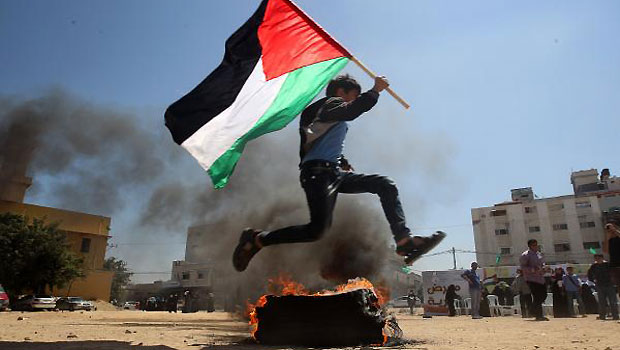
A Palestinian boy jumps over a tire burning during a reconstitution performance at a building which used to be an Israeli prison to hold Palestinians during Israel’s occupation of Gaza, in Gaza City. (AFP)
The delegation wants the legislative, presidential and Palestine National Council (PNC) elections to be put on hold, and for the two movements to form a national accord government headed by President Mahmud Abbas.
Informed Palestinian sources told Asharq Al-Awsat that, after meeting a number of Fatah and Hamas representatives and independent Palestinian figures, Egyptian officials were convinced that this insistence on holding elections will make Palestinian reconciliation more difficult.
The Egypt-sponsored reconciliation proposal called for Hamas to drop demands that PNC elections be held simultaneously with legislative and presidential elections. In return, Fatah would accept the national accord government for a year, instead of three months. Fatah and Hamas have both recently expressed reservations over this proposal.
The sources, which spoke to Asharq Al-Awsat on the condition of anonymity, also revealed that the Egyptian side believes that the possibility of holding elections in the West Bank and Gaza Strip is non-existent. This is due in part to the new Israeli government’s unwillingness to ensure suitable conditions for holding elections in the West Bank, and in part to the differences between the two movements on how these elections should be held.
According to one of the sources, the Egyptian mediators suggested that a national accord government carry out the task of merging the establishments in the West Bank and Gaza while also implementing social reconciliation.
Under the plan, the security services would not be merged until a later date. The source indicated that attempting to merge the two movements’ security services at this time would sideline the reconciliation process. The security situation is also open to interference by foreign parties, which might further stall any progress on reconciliation.
Another source said that Hamas has asked that measures be taken to ensure it can compete freely in the West Bank before elections are held there. This would require suspending the security measures of both Israel and the Palestinian Authority (PA).
The source pointed out that there is no guarantee that the Israeli government would commit to stopping its security measures, and that Israel will not agree to hold elections in occupied Jerusalem. This would give Hamas a means of justifying any refusal to participate in elections in the West Bank.
The sources explained that while the Egyptian delegation is likely to achieve only modest success, it hopes at least to improve trust and confidence between the two sides.
